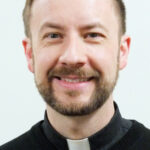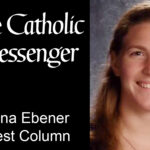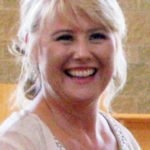By Barb Arland-Fye
The Catholic Messenger
Ten years ago, the Diocese of Davenport gained a sense of hope during bleak times when Bishop Martin Amos arrived from Cleveland, Ohio, his lifelong home, to serve as Eighth Bishop of the Diocese of Davenport.
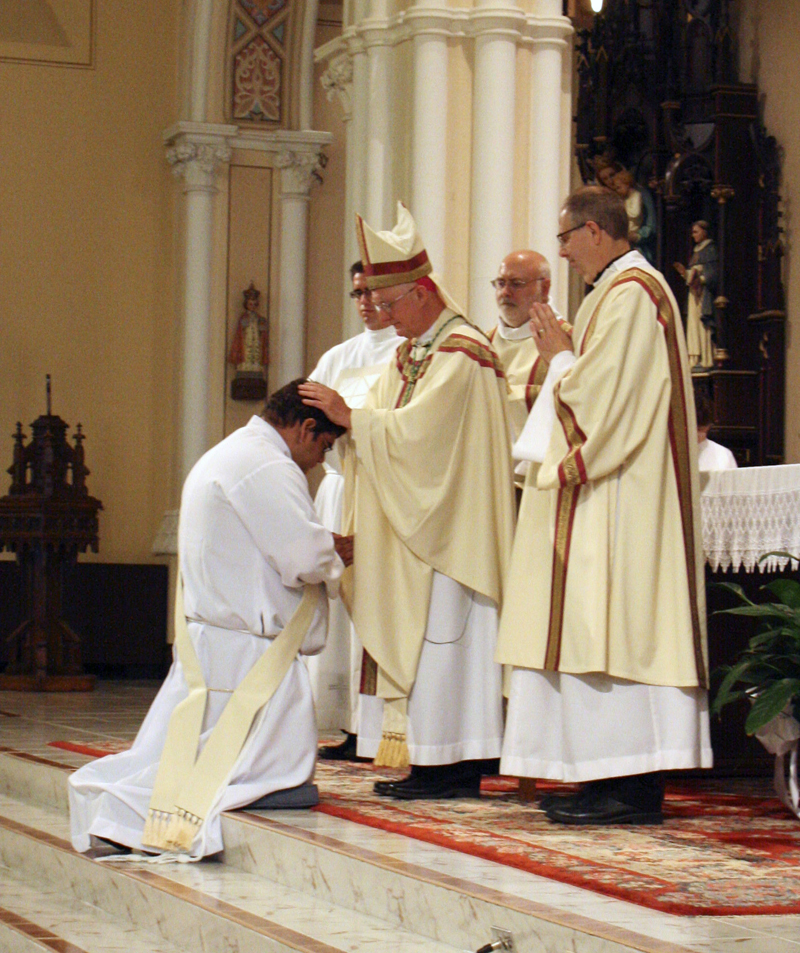
Bishop Martin Amos lays hands on Guillermo Trevino during the ordination ceremony June 6, 2014.
Bishop Amos didn’t have a clue about the location of Davenport, Iowa, when he received the call to lead the diocese. But he embraced his new home with warmth, humor, honesty and insight evident from the day of his introduction to the public in October 2006. Just one day earlier, the Davenport Diocese filed for bankruptcy in response to lawsuits stemming from clergy sexual abuse.
Catholics and non-Catholics alike attended his installation Mass on Nov. 20, 2006, at St. John Vianney Catholic Church in Bettendorf and welcomed him enthusiastically during a modest celebration afterwards at a Bettendorf hotel.
The diocese emerged from bankruptcy under the leadership of Bishop Amos. His pastoral approach guided the diocese’s response to survivors of clergy sexual abuse and to planning for the future of the church. His 10 years in the diocese have been fruitful in many ways, some of which he refers to in the following Q&A with Catholic Messenger Editor Barb Arland-Fye.
On Dec. 8, the Solemnity of the Immaculate Conception of the Blessed Virgin Mary, he will celebrate his 75th birthday, the mandatory retirement age for bishops. He jokes about scrawling his name on the retirement form, to convince Pope Francis that the bishop is ready to retire! It usually takes a number of months, though, before a resignation is accepted and a new bishop is named.
What is your favorite Scripture passage and book of the Bible?
I was very fortunate to have great Scripture courses in the seminary and then was able to teach the introductory courses in both Old Testament and New Testament at the college seminary. So I have a lot of favorites. I really like 1 Kings 19:9-14 where Elijah encounters God not in the places usually associated with a theophany but in the “whispering sound.” It seems like God often works that way in my life. I like the Book of Isaiah and Gospel of Luke.
What are some facts people might not know about you?
People who know me know that I am very neat and organized. My desk is usually clean when I leave the office and I always make my bed before I leave for the office. What they might not know . . . I have a junk drawer.
What are some highlights in your decade leading the diocese?
There have been many highlights, and so varied. Being able to present the Pacem in Terris award to Jean Vanier in France and to visit some of his L’Arche houses was memorable. I also was able to say Mass on the main altar in Notre Dame in Paris. Meetings with Pope Benedict XVI and Pope Francis (and St. John Paul II, before I arrived in Davenport) were also memorable.
What were the most memorable liturgies?
First it would be the ordination of our deacons and priests. To see seminarians grow during their seminary years and then to celebrate the ancient rites of ordination is a real privilege.
I was also privileged to be a co-consecrator for Bishop Robert Gruss when he was ordained a bishop in the Diocese of Rapid City, S.D. Other memorable liturgies included the consecration of five new churches and the many confirmations.
What lessons have you learned as bishop of our diocese?
You can’t please all of the people all of the time and some you can’t please at all! But, that said, I have the most supportive staff, clergy and faithful laity. They all make everything I do worthwhile. I hope I learned the principle of subsidiarity and offer support, but allow people to do their job without micro-managing their work. I learned I pray better when walking and that life is too short to let all the “small stuff” take away my peace.
What is an average day like for you?
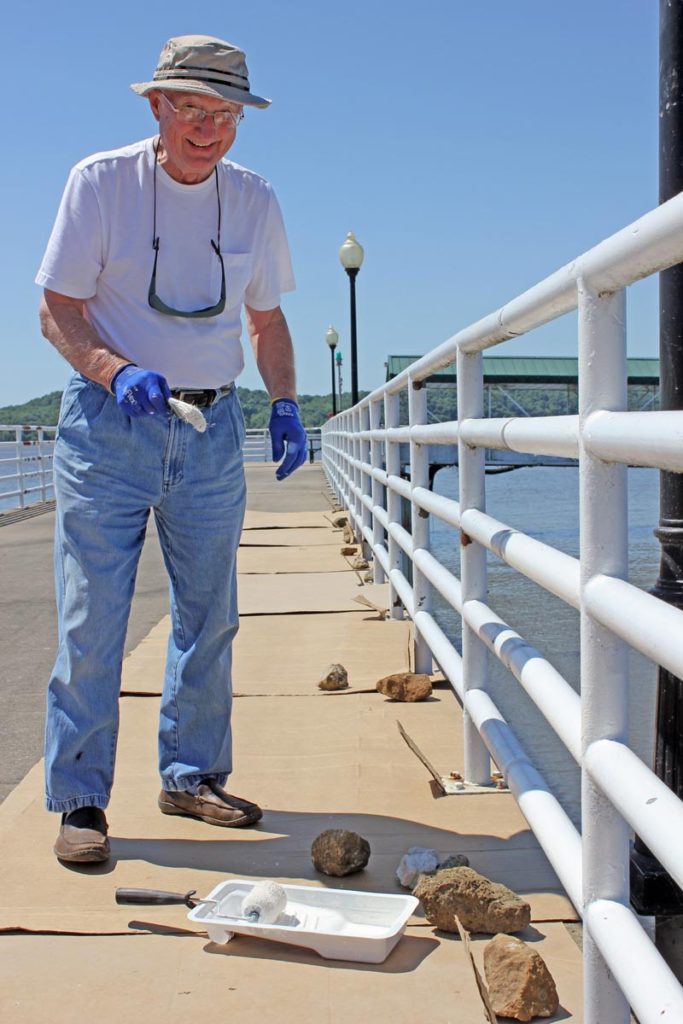
Bishop Martin Amos paints a railing along the Mississippi River at Fort Madison’s Riverview Park during Catholics in Action 2016.
There is no average day! Most days start out fairly average. I am usually up sometime around 5 a.m. Morning is my favorite time of the day. I get my coffee, read the paper while listening to the news (and usually have my cookie for breakfast). Then it is time to pray the Divine Office. I go to the office and look at emails and then frequently start working on homilies. I do spend a great deal of time on homilies and keep a list of which ones are coming up. Then there are scheduled and unscheduled meetings. I try to have an open door policy for staff. Frequently, I have a Mass somewhere, or celebrate with some of the resident priests or privately in my chapel. If I don’t have any plans in the evening, I like to prepare a nice evening meal, pray, watch some TV and go to bed early.
What do you like to do for relaxation or recreation?
During the spring and summer I do like “playing in the dirt,” planting and weeding. As I am getting older, I’ve cut back on how much of that I do. I enjoy cooking out on the grill, reading my novel outside and especially enjoy the evenings. Winter is another thing. I don’t like being cold. Just before I was appointed to Davenport, Hawaii was open for a bishop . . . didn’t happen. As I think about it, I am probably a lot more sedentary in the winter.
What are the three most pressing issues in the church today?
There are a number of issues in our society today which I believe have an impact on the church. The first is “secularization.” We see it in countries that were “Catholic” and now are almost totally secular. But, this is true in our country, too, where religion is somehow seen as irrelevant or purely personal. The second would be “relativism,” where there are no absolutes and all moral decisions are relative. The third would be within the church itself, and that is lack of knowledge and understanding of our faith. This is probably affected by the first two and the first two contribute to the third.
Who was or is your spiritual mentor?
Several very significant people and a number of others have influenced my spiritual life, beginning with several priests at our parish when I was growing up. There was a faculty member when I was a seminarian and a retired priest who was my spiritual director for a number of years. I also have a classmate with whom I have been able to share much of my spiritual journey over many years. I have keep for many years a list of people — lay, religious and clergy — who have influenced me. I pray over that list every year on my annual retreat and add names from the previous year. It helps me to realize how blessed I am.
When will you retire and what are you looking most forward to in retirement?
I’ll retire when the Holy Father says so! By Canon Law I will submit a letter of resignation as the Ordinary of the Diocese of Davenport on my 75th birthday. It will take time — probably months — before a successor is appointed. When I do retire I will remain a bishop and as such can continue to do most of what I do now, but without the responsibility of administration. I do enjoy what I do and hope to be able to minister as health allows and God directs. My plan is to move back to Cleveland, my home town, for at least six months to allow a new bishop the freedom to lead the diocese without any interference from me.









